Вы здесь
Grotto (cave) Nazugum.
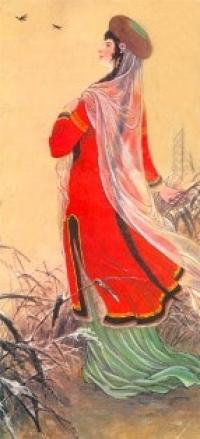
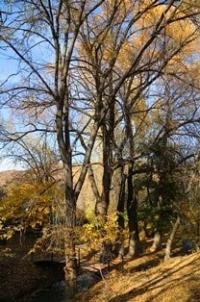
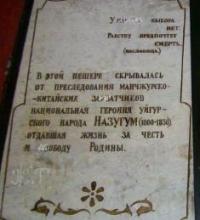
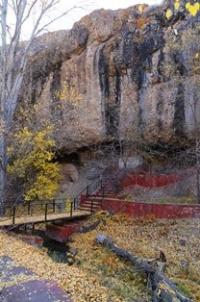
Traveling in Uygur district in Almaty region.
"Demons live opposite the gates of the temple"
Japanese proverb.
Sights of Uygur district in Almaty region.
The Nauzgum tectonic grotto is located on the northern slope of the Ketmen ridge, at an altitude of 1187 meters above sea level, on the left side of the rocky channel of the Piyazdeksai river, 8.7 kilometers northeast of the village of Ketmen and 6.9 kilometers east of the village of Sunkar in Uygur district in the east of the Almaty region.
The grotto is located 19 kilometers south of the Chundzha - Kolzhat highway, a country road is laid to it. The local population calls this place a cave, while it should be noted that such a structure of rocks is more like a canopy or grotto. In this place there is an entrance part of the cave, but the cave itself, unfortunately, does not exist.
It can be assumed that, at an earlier time, since the canopy is close to the water, it was used by ancient people as a comfortable dwelling. Such overhangs can occur in any rocks as a result of the formation of tectonic faults.
As a rule, such canopies are found in the sides of river valleys deeply cut into the plateau, when huge rock massifs break off the slopes and sides, forming subsidence cracks (sherlops). There are legends about the poetess' courage, perseverance and bravery, which are carefully preserved by the Uyghur people.
Nazugum is one of the favorite heroines and poetesses of the Uyghur people.
On the approaches to the famous Nazugum cave, named after the legendary daughter of the Uyghur people, a majestic landscape opens up. Magnificent mountains, whitened with gray hair, like elders, accompany your path. The stretching steppe expanses suddenly turn into rocky spurs.
In the depths of one of the rocks, there is a lonely cave black with soot - a silent witness of the last days of freedom Nazugum. Preserved traces of soot give this sacred place a piercing feeling of sadness and despair. The ominous silence inside the cave is broken by the monotonous sounds of falling drops.
Echoing one after another, they tell the truthful, sad and at the same time majestic story of Nazugum. The voices of distant ancestors, the creak of carts, the clatter of horses, the crackle of breaking spears. It was 1826 - one of the most dramatic periods in the history of East Turkestan.
The violent deprivation of land, constant oppression led the inhabitants of the city of Kashgar to open armed resistance against the Qing occupation. In the ranks of the rebels, dressed in a man's suit, next to her husband Bakim and brother Abdullah, 18-year-old Nazugum fought bravely.
The number of the enemy was far superior to the rebel forces. The last scattered units continue to offer desperate resistance. The young man, who easily dealt with experienced warriors, aroused particular bitterness among the Manchu-Chinese.
Several soldiers were ordered to surround and cut off the head of the impudent youth. In the heat of battle, dodging another saber, Nazugum did not notice how the sleeping hat let down her long hair. An incredibly beautiful girl who appeared in front of the amazed Chinese could become a good prey, which could either be sold profitably or given to the boss in exchange for a good position... T
o avoid new unrest, the conquerors en masse drive the surviving prisoners deep into the Ili Valley. Beautiful Uyghur women were in great demand among the Qing slave traders. .. .Long and sad road to a foreign land...
Among the women grieving about their slave lot, the death of their husbands and children, young Nazugum is crying. Her tremendous willpower, courage and resilience allow her to bear the news of the death of her husband and the murder of her 3-year-old daughter.
On the way, in one of the villages on the banks of the Ili, a well-known Chinese rich man Shi Sen buys Nazugum. The freedom-loving woman manages to escape on the very first night. Going down the river Ili on a makeshift raft, she broke away from the pursuit.
According to the songs of Nazugum herself, for 12 days she managed to hide from her pursuers, eating fish, hiding in the reeds during the day, and continuing her journey at night. A lone figure on a raft in the middle of a huge river attracts the attention of a local resident, who reported this to the authorities.
A detachment of pursuers led by the military commandant Solan sets fire to impassable reeds and forces the fugitive who has taken refuge in them to go out into the open steppe. The persecutors, struck by the beauty of the girl, wanting to earn gratitude, give her to their boss Jean-jugue.
However, the image of Nazugum haunts Solan. For a lot of money, he buys back the beautiful captive. After the wedding, desperately killing a drunken Solan, Nazugum again breaks out of captivity. Thorny bushes, endless steppe, impenetrable mountains - nothing could break the desire for will in the proud and implacable Nazugum.
They will set fire to the reeds, I will enter the waters of Ili. I will never become a wife, Solana with a black soul. The approaching cold will not allow her to continue her journey. After walking more than a hundred kilometers, a lonely, hungry, exhausted woman will have to take refuge in one of the caves of the Ketmen Mountains.
Damp stones, mountain, prickly wind - silent and constant companions of hungry Nazugum for six long months. Eerie, lonely nights and the incessant howl of wolves prowling in search of prey, do not allow a young woman numb from the cold to sleep.
A thatched bed in a dark cave does not save you from the piercing frost. What gave the unfortunate mother, who lost her husband and only child, strength to fight to the end without fear and regret, disdaining the comfort and rich, well-fed life that the madly in love conqueror Solan offered her?
Nazugum's poems state that this is a special, enthralling force, a huge feeling that can touch and excite every person. This is strength - love for freedom, for the Motherland, for the land where fathers and grandfathers lived, where Nazugum saw the light and grew up.
The news of a proud girl who dared to single-handedly challenge the mighty conquerors spread throughout the Ili Valley. Shocked by Nazugum's courage and unbending will, people memorized her poems, from mouth to mouth told about her exploits.
The appearance of numerous armed detachments, offering a large ransom for information about the escaped, and a severe punishment for harboring, intensified rumors about the feat of a proud woman. A resident of the village of Ketmen, old man Gulmet, driving his small flock of sheep to those places, accidentally discovers a fugitive.
Delighted with her strength of will and pride, he supports her with food and clothing, despite the fact that he was threatened with death for hiding. The lonely smoke from the hearth, which, due to the frost, the woman was forced to breed, attracts the attention of one of the many informers.
After a while, a detachment of pursuers, at the behest of the informer, easily discovers Nazugum's hideout. The siege of the doomed victim's refuge lasts for a long time. Qing warriors set fire to the cave from all sides. A breathless, weakened woman, forced to go out into the air for a breath of air, became an easy prey for the warriors who surrounded her.
She was shackled and sent to Kuldja with great security. Did the captive, who dreamed of returning home, think that her dream would come true in this way? While awaiting the verdict from Beijing, for 82 days, she is kept in the zindan, her neck and legs are shackled.
In order to avoid unrest among the Uighurs, it was decided to carry out the execution of Nazugum in secret among the Dungans. Guards armed to the teeth are leading the condemned. The appearance of a gentle, fragile and at the same time courageous girl in torn, bloody clothes moved the crowd.
From the scaffold, holding her head high, Nazugum looked around the square with her last glance. A huge crowd of Dungans is looking at the captive with curiosity. The beauty of her face could not be spoiled by neither torture, nor endless months spent in dark and damp zindan, nor iron shackles.
A beautiful, soulful face, framed by a thick head of hair, looked at the shocked people. Everything attracted in the face: a high clean forehead, fancifully curving eyebrows, expressive outline of the lips. But most of all, like a magnet, the gaze is attracted by extraordinary, large black eyes: such a piercing sadness and at the same time such a powerful, supernatural force lurked in them. The loud, strong voice of the girl suddenly cuts through the silence.
Let the despots burn
Their throne will be reduced to ashes.
Let them be destroyed
Enemies of equality and freedom.
With full breasts, breathing in the heady air of freedom, Nazugum sings her songs, hoping that her last words will touch the hearts of the Dungans and they will pass them on to her native Uyghurs. The song was filled with ardent love for the Motherland, for its people, for the long-awaited freedom.
There is a special sadness in her dying koshugs, but there is no sorrow and regret in them. With one stroke, the executioner interrupts the touching confession. The girl's delicate, thin neck, disfigured by marks from the shackles, allowed him to quickly complete his work. Nazugum met death with courage, having lived a short and heroic life.
The snow is melting - the water is muddy,
Well, where is she pure.
Where is my savior:
I am doomed to death.
Among the gorges and stones.
I've been hiding for days.
My mother is gone.
There is no her and no father
No tears on my face.
It can be seen at our parting.
There is a beginning, there is no end.
(Translated by N. Grebnev).
The silent stones in the dark cave breathe cold and sorrow. The falling drops continue their endless cry, sadly and majestically mourning the death of a courageous woman. Residents believe that it is the very soul of Nazugum who grieves over the unfulfilled dreams of the people.
An unbending example of perseverance, thirst for freedom, great sincere love for the native people could not fail to echo in the hearts of grateful descendants. A lonely cave in the Ketmen mountains has become a place of pilgrimage.
The people, who cherish the songs of Nazugum, continue to come to the last refuge of the freedom of a brave woman to express grief and admiration for the courageous daughter of the Uighur people. Old, filled-in notebooks at the entrance to the grotto keep reviews of our contemporaries.
With a special spontaneity and sincerity inherent only to children, a student of the Chundzha Kazakh school shares her impressions. Heartfelt poems, written in uneven children's handwriting by the daughter of the great Kazakh people, in whose veins the blood of heroic ancestors flows, who paid with their lives for the long-awaited independence of the Motherland, tells how Nazugum was excited by her story.
It is symbolic that this place stirred up in her heart the feelings inherent in the ancient and beautiful Tomiris, brave and courageous Manshuk Mametova, disinterested and courageous Aliya Moldagulova, awakening deep understanding, sincere compassion and admiration for Nazugum.
As long as in the hearts of descendants this historical place will kindle the sacred fire of love and admiration for the heroine's feat, Nazugum will live and continue to delight with an unbreakable will and devotion to ideals, and this historical place will fulfill its noble mission of educating and introducing peoples to unshakable eternal truth - noble and selfless love for the native land.
Geographic coordinates of the Nazugum grotto: N43 ° 28'53.41 "E80 ° 15'06.71"
Geographic coordinates of the turn to the Nazugum grotto from the Chundzha - Kolzhat highway: N43 ° 38'12.00 "E80 ° 15'20.91"
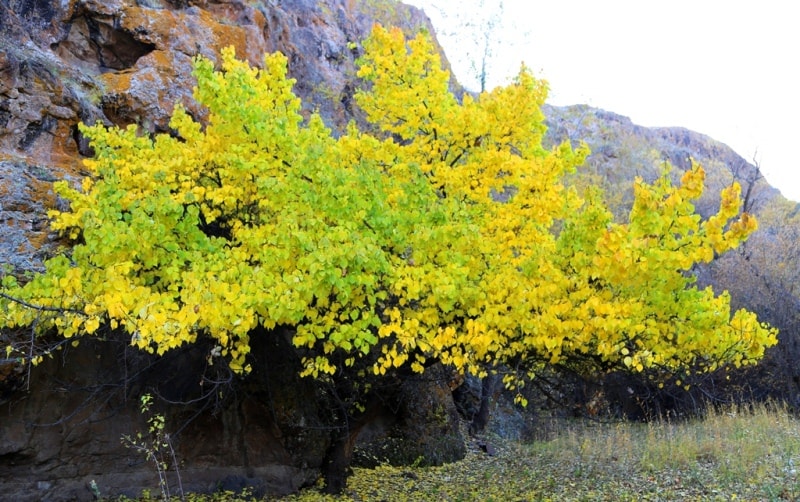
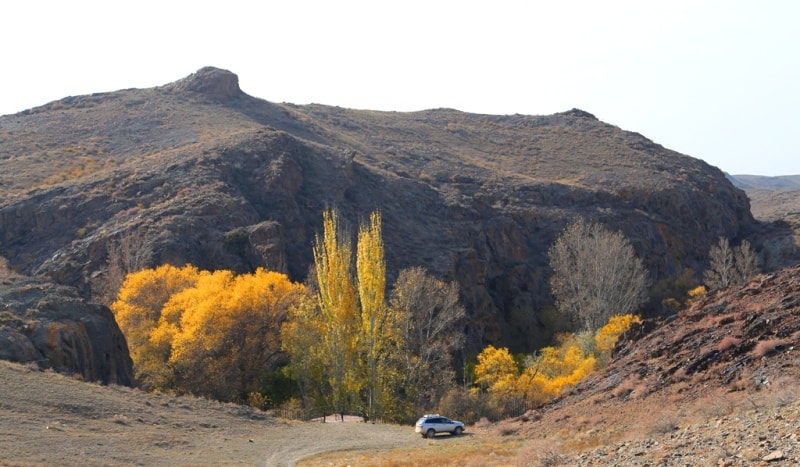
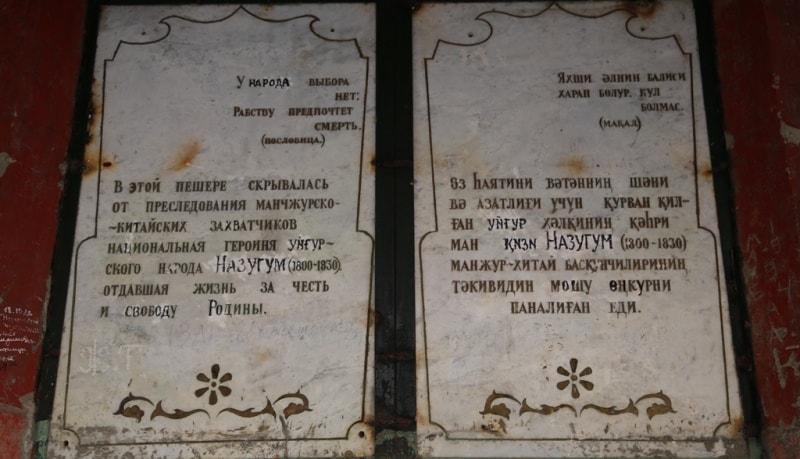
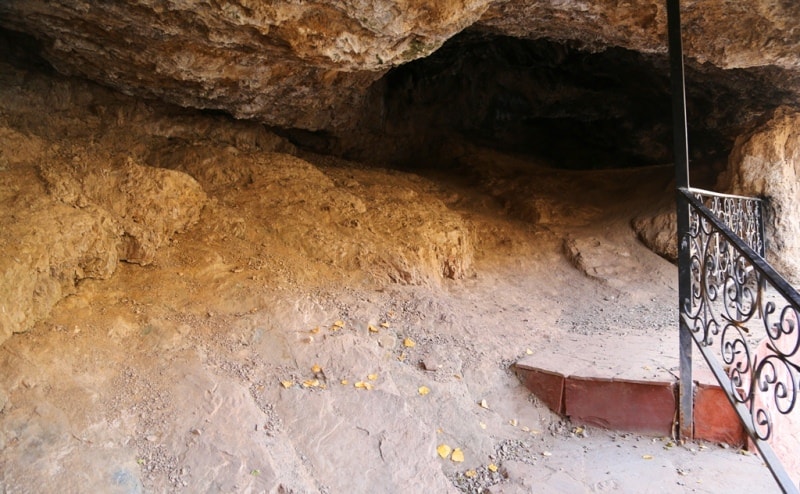
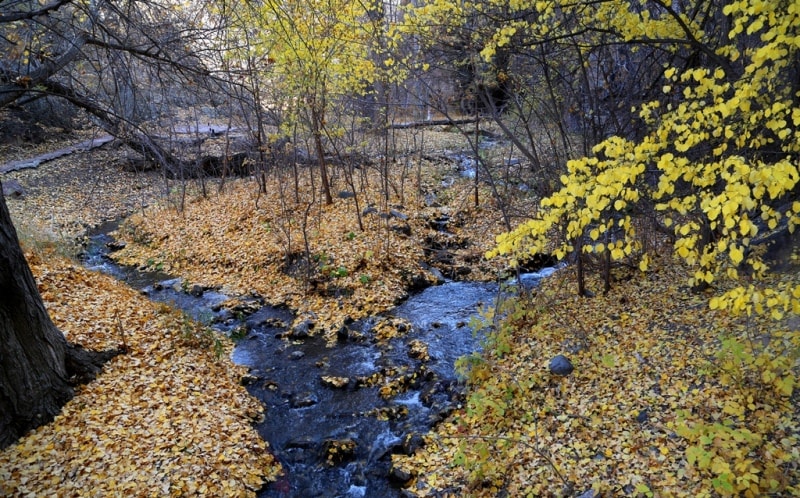
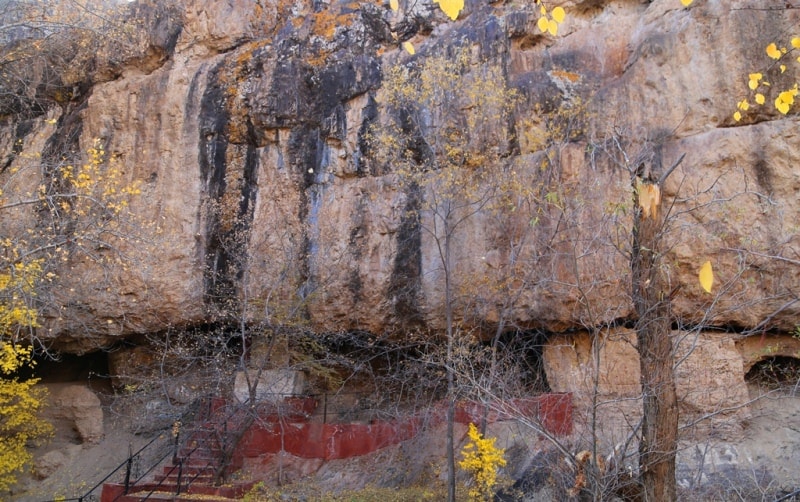
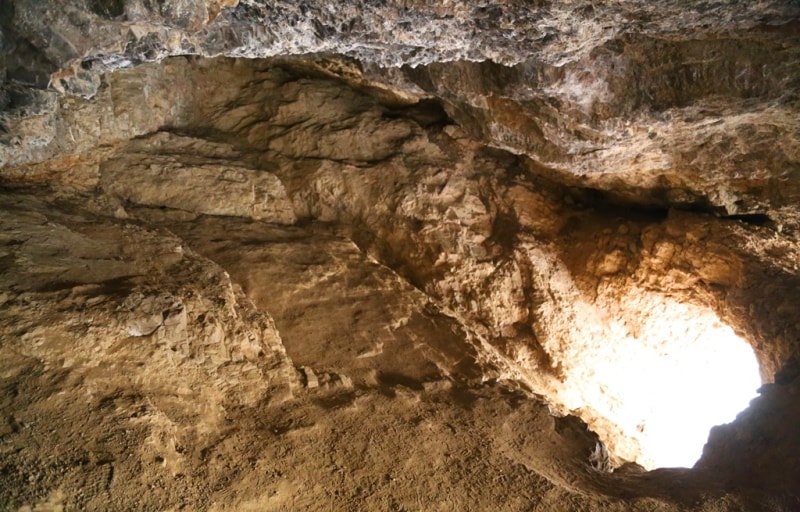
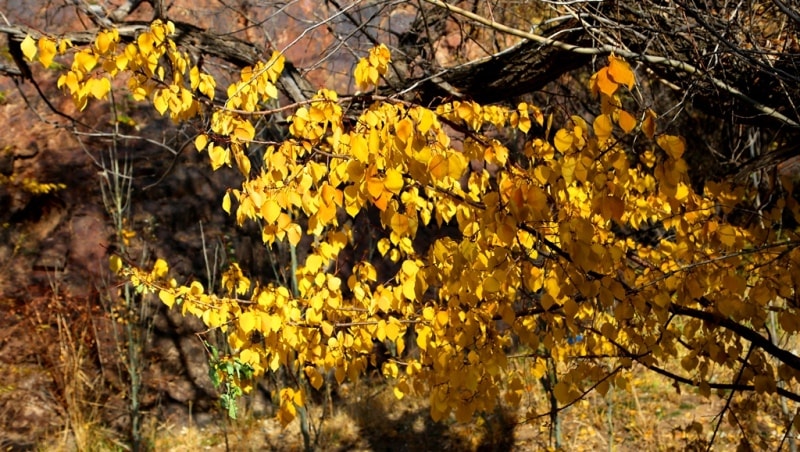
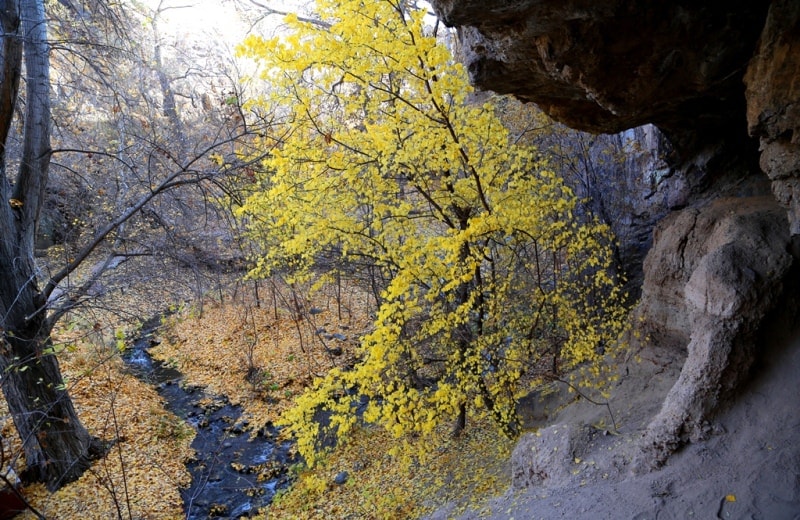
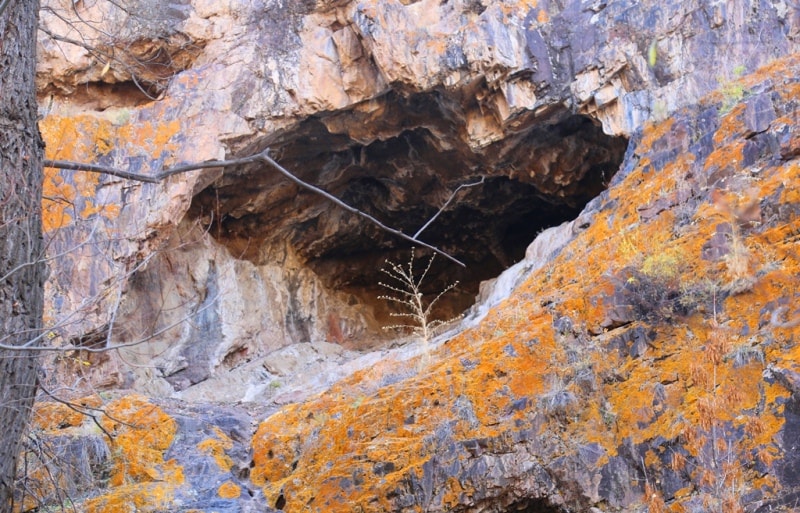
Authority:
Alexander Petrov.
https://ok.ru/uygurhalkim/topic/62291990894048
Photos by:
Alexander Petrov.







